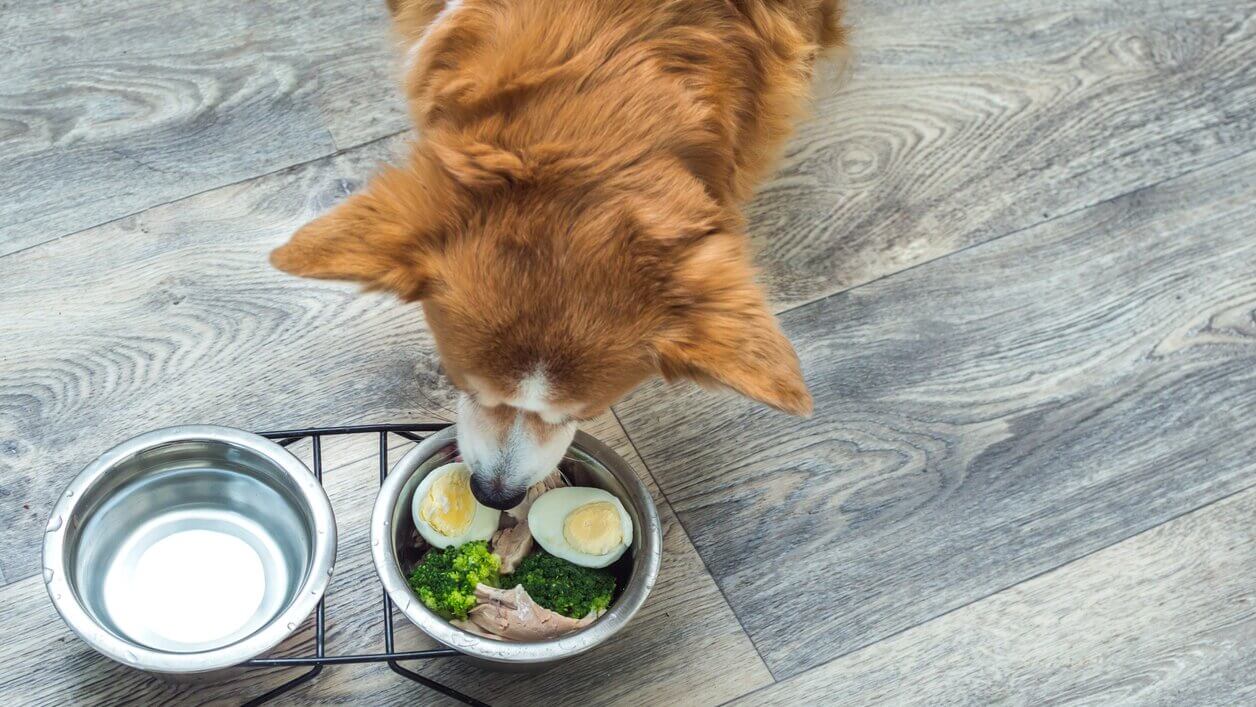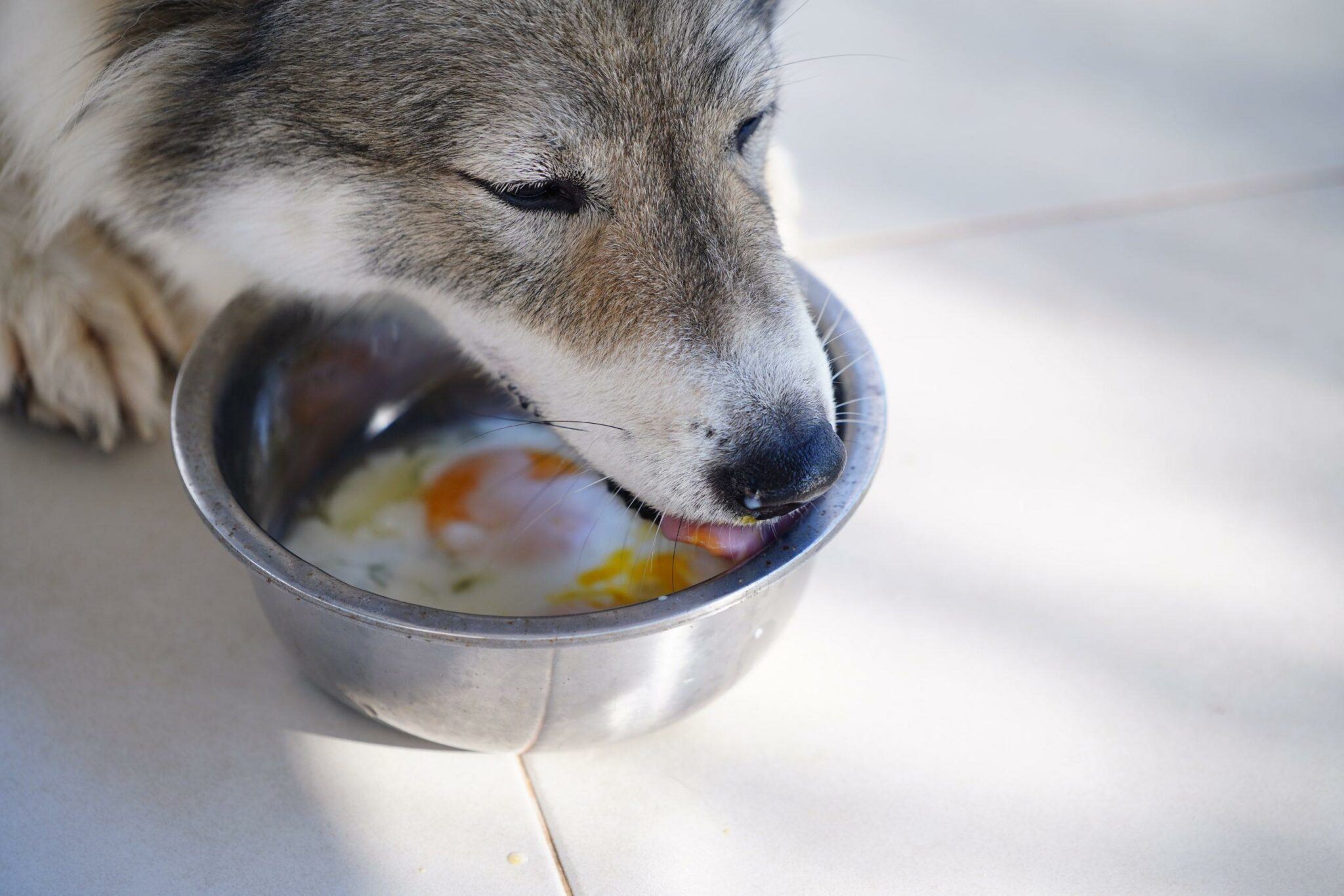Yes, dogs can eat eggs. Eggs are safe and healthy for dogs.
They provide protein and essential nutrients. Eggs are a great source of nutrition for our furry friends. They contain high-quality protein, vitamins, and minerals that are beneficial for dogs. But, like any food, moderation is key. Too many eggs can lead to health issues.
It’s important to know the right way to prepare eggs for your dog. Raw eggs can carry bacteria like Salmonella, which can be harmful. Cooked eggs are safer and easier for dogs to digest. This guide will explore the benefits and risks of feeding eggs to dogs. We will also discuss the best ways to serve eggs to ensure your dog stays healthy and happy.
Nutritional Benefits
Eggs can be a healthy addition to your dog’s diet. They offer numerous nutritional benefits that support your dog’s overall health. Let’s explore how eggs can be a valuable addition to your dog’s meals under these categories.
Protein Source
Eggs are a fantastic source of protein for dogs. Protein is essential for muscle development and repair. It helps maintain healthy skin and coat. High-quality protein in eggs supports your dog’s energy levels. It also aids in immune function.
Vitamins And Minerals
Eggs are rich in essential vitamins and minerals. They contain vitamins A, D, E, and B-complex. These vitamins support various bodily functions. Vitamin A promotes healthy vision. Vitamin D aids in calcium absorption for strong bones. Vitamin E is an antioxidant that protects cells. B-complex vitamins boost metabolism and brain function.
Eggs also provide essential minerals like iron, zinc, and selenium. Iron helps in red blood cell production. Zinc supports the immune system and wound healing. Selenium acts as an antioxidant, protecting cells from damage.

Credit: www.dogsnaturallymagazine.com
Egg Varieties
Dogs can enjoy eggs as a nutritious treat. Eggs are packed with protein and essential vitamins. Always cook eggs before serving to avoid health risks.
Eggs are a nutritious treat for dogs, but not all eggs are equal. Different types of eggs can impact your dog’s health in various ways. Let’s dive into the specifics of raw and cooked eggs to help you make informed choices.Raw Eggs
Feeding your dog raw eggs is a topic of debate. Some dog owners swear by it, believing raw eggs provide the most natural and nutrient-dense option. Raw eggs are rich in protein and essential fatty acids. However, they can also carry bacteria like Salmonella, posing a risk to your dog’s health. Consider this: Do you feel comfortable handling raw eggs for your dog? If not, you may want to consider other options.Cooked Eggs
Cooked eggs are generally safer for dogs. Cooking eliminates harmful bacteria, making them a reliable choice for a healthy treat. You can offer your dog scrambled, boiled, or poached eggs. Just avoid adding salt, butter, or other seasonings that could harm your pet. Quick tip: When cooking eggs for your dog, keep it simple. Plain eggs are not only safer but also easier on your dog’s stomach. Have you ever noticed your dog showing more energy after eating eggs? That’s no surprise, as eggs are a great source of protein, helping to fuel their day. Question for you: Which egg variety does your dog prefer? Have you noticed a difference in their health or energy levels? Feel free to experiment with both raw and cooked eggs while keeping safety in mind. Your dog’s health and happiness are worth it.Safety Concerns
Eggs can be a nutritious treat for dogs, but there are safety concerns. Raw eggs may carry bacteria, and cooked eggs should be served plain without seasonings. Consult a vet for advice on feeding your dog eggs safely.
When considering whether to feed your dog eggs, safety concerns should be at the forefront. While eggs can be a nutritious addition to your dog’s diet, it’s essential to understand the potential risks involved. Let’s dive into two significant safety concerns: Salmonella Risk and Allergic Reactions.Salmonella Risk
Eggs can carry salmonella, a harmful bacteria. Dogs, like humans, can get sick from salmonella. Symptoms include vomiting, diarrhea, and lethargy. Cooking eggs thoroughly can reduce this risk. Hard-boiled or scrambled eggs are safer options. Always ensure eggs are fresh and properly stored.Allergic Reactions
Some dogs may be allergic to eggs. Allergies can cause itching, ear infections, and digestive issues. Watch for signs like excessive scratching or gastrointestinal upset after feeding eggs. If your dog shows allergy symptoms, consult your vet. You might need to eliminate eggs from their diet. Always introduce new foods gradually. In my experience, my dog had an allergic reaction to eggs. It started with itching and progressed to ear infections. Removing eggs from her diet resolved these issues. Do you know if your dog has food allergies? It’s worth paying attention to their reactions after eating eggs.
Credit: www.rover.com
Feeding Frequency
Feeding frequency is crucial in determining how often you should give eggs to your dog. Eggs are packed with nutrients, but it’s important to balance their consumption. Overfeeding can lead to health issues, while underfeeding may not provide the full benefits. Let’s explore how often you can safely feed eggs to your furry friend.
Daily Intake
Some pet owners wonder if they can feed their dogs eggs daily. Dogs can eat eggs daily, but in moderation. One egg per day is often enough. This amount provides essential nutrients without overloading their diet. Too many eggs can cause weight gain. Also, it may lead to an imbalance in their diet.
Occasional Treat
Feeding eggs as an occasional treat is another option. Offering eggs a few times a week can be beneficial. This way, your dog gets the nutritional boost without the risk of overfeeding. Eggs can be a special addition to their usual meals. It keeps their diet varied and interesting.
Preparation Methods
Different preparation methods can make eggs safe and tasty for dogs. Boiled or scrambled eggs are simple and healthy. Avoid adding salt or spices.
Are you wondering how to prepare eggs for your dog? Eggs are a nutritious treat when served the right way. Let’s dive into two common preparation methods: boiled and scrambled eggs.Boiled Eggs
Boiled eggs are a simple and healthy option for your dog. They retain most of their nutrients and are easy to prepare. Just boil an egg for about 9-12 minutes, let it cool, peel off the shell, and cut it into small pieces. Your dog might find boiled eggs a delicious snack or a tasty addition to their regular meal. Make sure not to add any salt, spices, or other seasonings. Dogs’ stomachs are sensitive to these and can get upset easily.Scrambled Eggs
Scrambled eggs can be another delightful treat for your furry friend. They are soft, easy to chew, and digestible. To prepare scrambled eggs, simply whisk an egg and cook it in a non-stick pan without any oil, butter, or seasoning. Serve the scrambled eggs plain. Avoid adding milk or any other ingredients. Scrambled eggs can be a wonderful way to provide your dog with a protein boost. Have you ever shared your breakfast with your dog? You might be surprised at how much they enjoy simple, plain scrambled eggs. How do you usually prepare eggs for your dog? Share your tips and experiences in the comments. Remember, moderation is key. Too many eggs can lead to weight gain and other health issues. Always consult your vet before making significant changes to your dog’s diet.Portion Sizes
Eggs are safe for dogs in small amounts. Serving them cooked and plain is best. Avoid adding seasonings or oils.
Eggs can be a nutritious addition to your dog’s diet, but portion sizes are crucial. Too much of a good thing can lead to issues. So how do you know the right amount for your furry friend?Small Breeds
Small breeds have tiny stomachs and lower calorie needs. Giving them a whole egg at once can be overwhelming. Start with a quarter or half an egg. Observe how your dog reacts. If they seem satisfied and show no digestive issues, you can keep this amount. Always balance it with their regular food.Large Breeds
Large breeds can handle more, but they don’t need a dozen eggs. One or two eggs per week is usually sufficient. Keep an eye on their overall diet. Eggs should complement, not replace, their balanced meals. Too many eggs can add excess calories and upset their stomach. Have you noticed how your dog reacts to different foods? It’s vital to monitor their health and adjust portions accordingly. Small changes can make a big difference.Alternative Protein Sources
Dogs love eggs. But you might wonder about other protein sources. Eggs are great, but variety is important for a balanced diet. Here, we explore alternative protein sources for dogs.
Meat Options
Meat is a primary protein source for dogs. Chicken is a popular choice. It is lean and easy to digest. Beef provides essential nutrients. It’s rich in iron and zinc. Turkey is another good option. It’s lower in fat than beef. Lamb offers a unique taste and is good for dogs with allergies. Pork is high in protein but should be given in moderation due to fat content.
Plant-based Proteins
Plant-based proteins can be a healthy addition. Lentils are rich in protein and fiber. They help with digestion. Quinoa is a complete protein. It contains all essential amino acids. Chickpeas are another option. They provide protein and are low in fat. Peas are often found in dog food. They are a good protein source. Sweet potatoes are also beneficial. They offer protein along with vitamins and minerals.
Veterinarian Advice
Can dogs eat eggs? Many pet owners ask this question. Eggs can be a good source of protein for dogs. But before you add them to your dog’s diet, expert advice is crucial. Veterinarians have valuable insights on this topic.
Consulting Experts
Always consult your vet before introducing eggs to your dog’s diet. Vets can provide personalized advice. They consider your dog’s age, breed, and health status. Each dog is unique. What works for one may not work for another.
Vets can also identify any allergies. Some dogs might have an egg allergy. Early detection can prevent health issues. So, a vet’s consultation is vital.
Health Monitoring
After introducing eggs, monitor your dog’s health. Watch for any signs of discomfort or allergies. Symptoms might include itching, digestive issues, or lethargy. Regular check-ups with your vet can help track your dog’s health.
Vets recommend starting with small portions. Gradually increase the amount if no issues arise. Monitoring helps ensure your dog benefits from eggs without adverse effects.

Credit: mypetnutritionist.com
Frequently Asked Questions
Can Dogs Eat Cooked Eggs?
Yes, dogs can eat cooked eggs. They are a good source of protein and nutrients. Always ensure eggs are fully cooked to avoid health risks. Avoid adding salt or seasoning.
How Much Egg Can I Give My Dog?
Dogs can eat eggs in moderation. One egg per day is usually safe for most dogs. Consult your vet for personalized advice.
Are Scrambled Eggs Ok For Dogs?
Yes, scrambled eggs are safe for dogs. They provide protein and essential nutrients. Avoid adding salt, pepper, or butter. Moderation is key.
Are Eggs A Laxative For Dogs?
Eggs are not natural laxatives for dogs. They can help with digestion and provide essential nutrients. Always feed eggs in moderation.
Conclusion
Dogs can eat eggs in moderation. Eggs provide protein and essential nutrients. Always cook eggs before feeding them to dogs. Raw eggs might carry harmful bacteria. Consult your vet for specific dietary advice. Monitor your dog for any allergies. Eggs should be an occasional treat, not a main meal.
Ensure a balanced diet for your dog’s overall health. Happy feeding!

